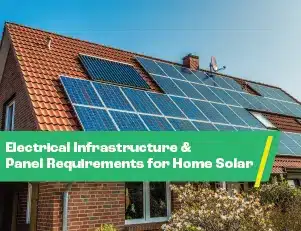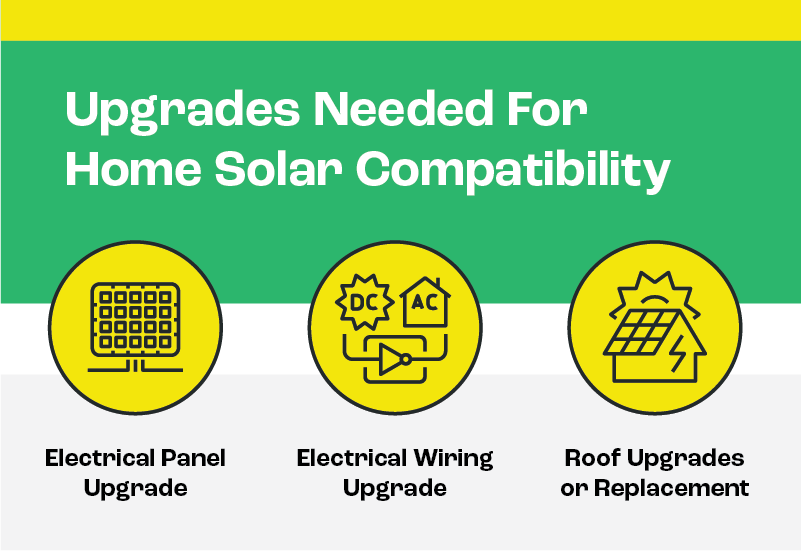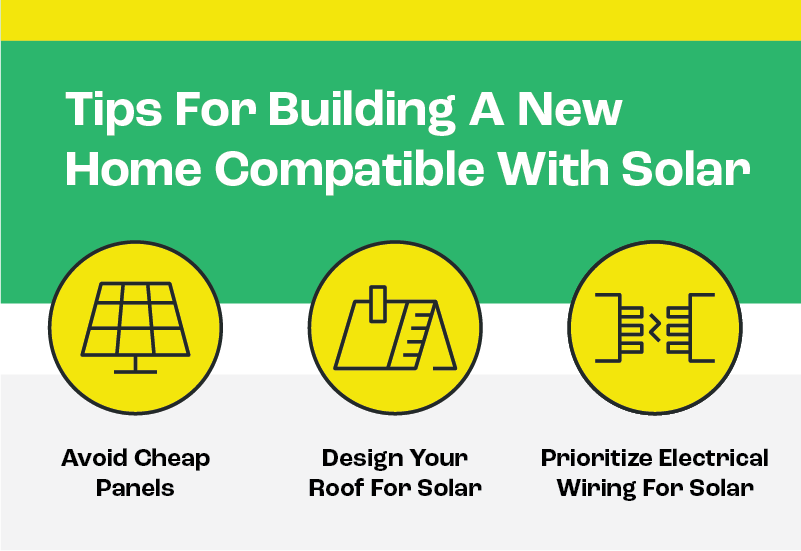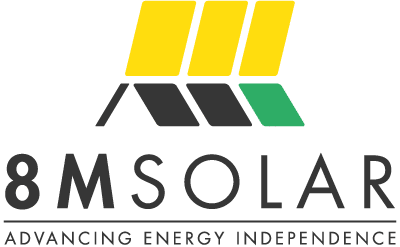
Installing solar panels on your home is exciting. It’s a sure way to start saving on your electric bill, and start contributing to a cleaner environment all in one. Most people feel that installing solar panels is easy, you find a solar company that you love, buy the panels, buy a few gadgets to hook everything up to your home, pay the installer, and then you have solar panels! However, for some the path to solar panels is not as easy, and can be potentially more expensive.
Before solar panels can be installed, there are electrical panel requirements for solar that must be met. Most homes that don’t meet these requirements are older and need some upgrades, or have cheaper meter main combined panels which in the long run results in added costs for homeowners. Additionally, there are steps homeowners who are building new homes can take to ensure the best compatibility with home solar.
In this article, we’ll cover the main upgrades needed to meet electrical panel requirements for solar, and walk through steps new homeowners can take to make the integration of home solar easier and cheaper.
Upgrades Needed For Home Solar Compatibility

Electrical Panel Upgrade
An electrical panel is a service box that connects main power lines to a home, and distributes electrical currents throughout the home. For newer homes, an electrical panel upgrade is most often only needed if the current electrical panel has an amperage that is too low to accommodate the electricity that will be generated by solar panels. Generally, most homes need a panel that can accommodate 200 amps, however there are higher and lower amp panels available depending on your home’s need. We’ve seen this replacement cost anywhere between a few hundred dollars, to a thousand or few thousand dollars depending on the switch needed.
For older homes, an electrical panel upgrade will most often be needed because the current panel is old and not able to accommodate solar panel conversion. If you are concerned about needing an electric panel upgrade for solar, discuss your current system in a virtual consultation with 8MSolar, or consider sending us a picture of your current system to know your best options.
Additionally, solar batteries will always require a critical load panel to be installed to accommodate the energy storage.
Electrical Wiring Upgrade
For compatibility with solar panels, home electrical conduits need to run through the roof of a home. For this upgrade, labor and material costs will vary depending on the specific upgrades that are needed. Factors to consider asking your North Carolina solar installer to include; Will rewiring be required? Do copper grounding, sub-panels, or split-circuits need additional attention? Are there outlets, fixtures, or fittings that are worn down and need replacement? All of these factors need to be considered and, where necessary, upgraded before home solar installation can take place.
Roof Upgrades or Replacement
Solar panels can last for more than 30 years. To be sure that your solar panels don’t need to be removed or reinstalled because of roof upgrades (which cost most), it is important to consider upgrading your roof before turning to solar panels. For some roofs, it’s as simple as re-shingling to prepare for having solar panels installed. For other roofs, entire replacements might be needed to support the new installation. Consult with your solar company, and keep in mind that most upgrades and replacements will need to take place with roofing experts before your solar company can install.
Tips For Building A New Home Compatible With Solar

Avoid Cheap Panels
When looking to go solar for the first time, many home and business owners will look for the cheapest option. This is especially true if homeowners just spent a lot of money building their dream home. However, we have found that in the long run, cheap solar options will cost owners more than it will help them save. Additionally, if homeowners want to eventually expand their solar system, cheap panels are impossible to pair with new, upgraded panels, and homeowners would have to start all over.
Design Your Roof For Solar
Most solar companies can work around different roof structures to install solar panels. However, there are best practices for roofs to get the most out of going solar. If you are building a new home, and plan to install solar panels, these tips will be beneficial for installing your new PV system. Roof materials that are most compatible with solar panels include asphalt shingle roofing, tile roofing, and standing metal roofing. Roof materials that are not compatible with solar include wood and slate roofs.
Additionally, the angle or pitch of your roof can make solar installation easier. The ideal angle for solar panels is 30 degrees, which is a 7/12 roof pitch. If you have a steeper roof pitch, you can still have efficient solar panels, however anything steeper than 40 degrees is most likely too steep. If your roof is flat, then stilts can be used to improve the angle of your panels, though installation will most likely cost extra.
In the northern hemisphere, solar panels work best when faced true south, in an effort to get the most from the sun’s rays. This is another tip to keep in mind when designing your roof, to ensure your south-facing roof has room to accommodate solar panels. Additionally, keep in mind that it is best to not have your solar panels shaded. Avoid planning to have your panels in a place that will be easily shaded by trees, or other outside structures.
Prioritize Electrical Wiring For Solar
Simplify your life a little and plan to have pre-run electrical conduits go to the roof. This will make solar installation easier, and help to avoid any electrical changes that would be needed to comply with solar installation. A simple request that will make your life a lot easier!
8MSolar Can Help
Whether you planned ahead and have the perfect home scenario for installing solar panels, or need a little help to get started, 8MSolar is your partner through every step of the process. Contact us today to get started with a free virtual consultation and a quote for your unique solar panel system.

